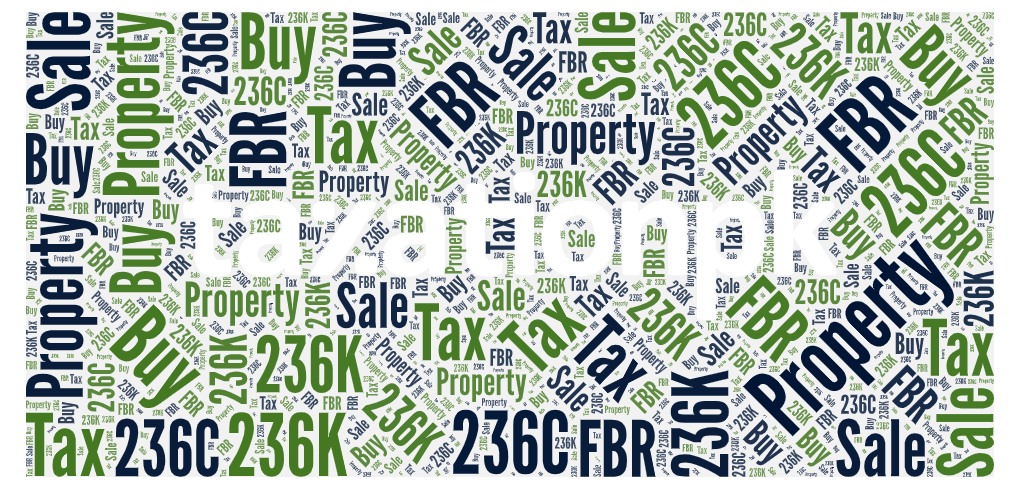The recently announced Finance Act 2024 introduces changes to property transaction taxes. This article clarifies the new tax rates for both buying and selling immovable property (land, buildings, etc.), with a clear comparison for filers (those who submit tax returns) and non-filers.
Understanding Filers and Non-Filers:
- Filers: Individuals who have registered with the Federal Board of Revenue (FBR) and submit their tax returns.
- Non-Filers: Individuals who haven’t registered with the FBR or submitted tax returns.
- Late Filers:Individuals who have not filed tax return for past three years within due date.
The concept of Active (Late Filer) is applicable from 1st November, 2024. For Update on late filer status visit. Active (Late Filer)
Tax on Buying Property (Section 236K):
This tax is deducted at source from the buyer and deposited with the government. Here’s a table summarizing the rates:
| Rs. in Million | Tax Rate (Filers) | Late Filers | Non-Filers |
| Up to 50 | 3% | 6% | 12% |
| Over 50 but not exceeding 100 | 3.5% | 7% | 16% |
| Over 100 | 4% | 8% | 20% |
Tax on Selling Property (Section 236C):
This tax is collected at source from the seller and deposited with the government. Here’s a table highlighting the key differences:
| Rs. in Million | Tax Rate (Filers) | Late Filers | Non-Filers |
| Up to 50 | 3% | 6% | 10% |
| Over 50 but not exceeding 100 | 3.5% | 7% | 10% |
| Over 100 | 4% | 8% | 10% |
For specific property rates and additional details, visit the official Property Rates by FBR.
Property Tax Calculator
Key Takeaways:
- Filers maintain the same tax rates for buying property compared to the previous year.
- Non-filers face a significant tax hike for both buying and selling property.
- There’s a substantial penalty for filers who haven’t filed their returns by the due date when selling property (increased tax rates of 6%, 7%, and 8% based on consideration value).
- If property is bought and sold within same year this tax is not adjustable.
Benefits of Being a Filer:
- Lower tax rates compared to non-filers for property transactions.
- Access to various benefits and opportunities offered by the government.
Exemption from 236C:
- Exemption for Dependents of Shaheeds and War Wounded: Individuals who are dependents of Shaheeds (martyrs) of the Pakistan Armed Forces or persons who died while serving in the armed forces or government are exempt from the tax.
- Exemption for Property Acquired Through Government Allotment: The exemption applies to the first sale of property acquired from or allotted by the federal or provincial government.
- Recognition of Service: The property must have been acquired or allotted as a recognition of the services rendered by the Shaheed or the deceased government servant.
- Exemption for War Wounded and Serving/Ex-Personnel: The exemption extends to war wounded personnel, serving and ex-servicemen of the armed forces, and serving and ex-employees of the federal and provincial government.
Understanding these new tax rates is crucial for informed decision-making when buying or selling property in Pakistan. It incentivizes timely filing of tax returns to avoid penalties. Consulting with a tax advisor is recommended for specific guidance based on your individual circumstances.


Feb 22, 2024 03:00 PM Asia/Karachi
Webinar ID 862 4217 2659
Passcode 729228
If property is from ancestral and acquired by way of inheritance in the year 1982 then what will be the tax criteria
Capital Gains and 7E (if exempt) will not be payable. Rest of Taxes as above will be applicable.
No tax on inherited property
Yes but when inherited. If transfered to someone else, then that will be taxable.
I am government employee and my job is still on contract. My salary is 59000, Do I also have to pay tax? Any idea?
Taxes (if payable) will be deducted from your salary at source. However (if taxable) you need to file tax-returns.
Yes the tax will be deducted from your salary on 9000 only. submit your tax return to the FBR so as your status will be changed to active tax filer.
If I want to sell my property because of unemployment and I need money…then why should I pay tax? It’s my home.my earnings , my hard work . Govt doesn’t give us money when we are unemployed….but wants all money from us ..isn’t it unfair????..
This is advance tax in nature, so if you are filing then claim for refund.